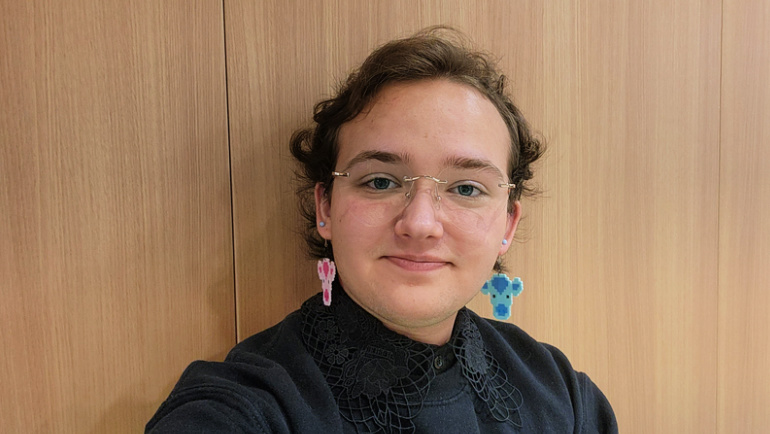
While Austin Ash is earning a master’s in social work from Wayne State University’s School of Social Work, he’s also become an expert in creating community wherever he goes. Ash, who uses he/they pronouns, plans to use that invaluable skill in their future as a clinical social worker.
“I tell people if you can’t find community, make your own,” he said. “I want to support the voices of people who aren’t normally represented, to help them find their community. I would love to make just one person feel validated and heard.”
Ash’s academic work has focused on interpersonal social work, and he hopes to work with young adults who engage in non-suicidal self-injury and individuals within the trans, gender non-conforming, and LGBTQIA+ community.
Their commitment to serving and supporting those who are not traditionally represented and may feel alone comes from a place of personal experience. Beyond providing professional expertise, Ash’s experience as a nonbinary trans man has inspired them to become a self-described ‘loud, proud activist’ for themselves and others.
“There was no representation of people like myself when I was growing up. I learned what trans was when I was in college — there was suddenly a word for what I had been experiencing for a long time,” he said. “I’ve learned that it’s so important to live bravely and be yourself, so others can see that that experience is valid and that it can be a happy one. No one is alone — there is space for everyone in society.”
An early calling
Ash said that their interest in understanding and helping others started at a young age. He earned an associate degree from Oakland Community College, where he focused on social work and mental health. Ash transferred to Wayne State, where he earned a bachelor’s in social work in 2021 and immediately pursued an advanced master’s.
“Anwar (Najor-Durack) came and spoke about the program, and it sounded amazing, Ash said. “I knew I wanted to work and learn in a diverse environment, so Wayne State and Detroit appealed to me. The program more than exceeded all expectations.”
“I knew what I wanted, and I was able to get straight to it,” he said. “I initially wanted to work in forensic psychology, but once I learned more about social justice and the role of social work I decided to focus more on mental health and advocacy.”
They credit faculty in the School of Social Work — including Joy Ernst, Jun Sung Hong, Teresa Green, Karen Weiner and Judith Wineman — in helping focus their aspirations in the field.
Getting involved
Beyond excelling in the classroom, Ash was highly engaged on campus.
“I have loved working with Andre (Iadipaolo) who, among many things, coordinates Social Work student organizations,” he said. “My advice to any student would be to make the effort to connect with others who share your passions.”
He served as a social work peer mentor, supporting fellow students academically and helping them engage on campus. When the pandemic forced social distancing, he created a WhatsApp chat — which remains active three years later — for the cohort to stay connected. Ash is also the co-president of the Social Work Queer Alliance, which has focused advocacy efforts and programming on everything from social justice issues and mental health to public health and policy awareness.
Ash was also involved with Counseling and Psychological Services (CAPS) as an intern, where he led individual counseling sessions and group sessions focusing on grief and loss support. Further, their internship work focused on understanding anxiety, depression and stress among college students and communicating the availability of free on-campus resources.
While time management was a challenge for Ash, he said becoming engaged on campus was worth the effort.
“Being able to meet my colleagues and cohort and to learn from their experiences was so rewarding,” he said. “As much as I love research, I’ve learned so much more from them. Being able to work and hear their own voices is irreplaceable. You don’t get that depth in a textbook.”
Ash encourages all students to work to build such community with their cohort — and their professors.
“Yes, it can be scary to email a professor. But it’s worth it. Being able to hear from those who came in the field before you — they’re just handing out invaluable experience and knowledge,” he said. “They want to help and share that information. Take it!”
